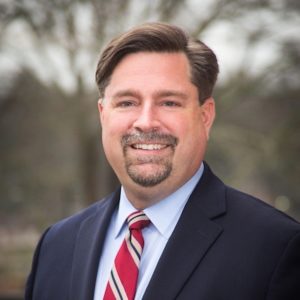Spotlight on Mediator & Arbitrator Steve Dunn
Tue, Jun 30th, 2020 | by Miles Mediation and Arbitration | Get to Know our Neutrals, News | Social Share

If you’ve ever watched House MD, you’ll know the adage, “Patients always lie.” Ask an attorney, and they’ll say something similar — but not about their clients. Even lawyers who have only been litigating a short time will attest to Steve Dunn’s observation:
Juries are unpredictable.
Steve learned this early on, during a mock trial at law school.
This formative experience planted a seed that eventually grew
into a full-time career in mediation and arbitration.
The Uncertainty of Litigation
In courtroom dramas, the breathtaking precision of cross-examination or the suspense of last-minute evidence makes going to trial seem like the surefire (and even preferred) way to win.
Behind-the-scenes and “IRL” (in real life), nothing could be further from the truth. Steve witnessed the arbitrary nature of jurors’ decisions when his mock trial defense team had the chance to be proverbial flies-on-the-wall, secretly observing the jurors’ deliberation. He learned that day what every experienced attorney eventually discovers:
- Jurors often focus on entirely random, unimportant, and arbitrary factors in their decision-making;
- They frequently get the significant details of a case completely wrong; and
- As human beings, they are influenced by biases and assumptions no judge’s instruction can overcome.
- Unexpected results occur at trial time and again, making litigation not only exhausting but, for all a litigator’s efforts and the client’s time and money, risky. You are never guaranteed a favorable outcome and you may not even come out with a result that makes sense.
Steve graduated from law school and started his career thinking, even then, “There has to be a better way.”
Valuing the Art and Skill of Mediation in Action
 Fast forward a few years, and Steve evolved into a successful partner at a boutique employment litigation firm in Charlotte, NC. Originally skeptical of the mediation process, Steve’s first experience with a truly gifted neutral was both transformational and enlightening.
Fast forward a few years, and Steve evolved into a successful partner at a boutique employment litigation firm in Charlotte, NC. Originally skeptical of the mediation process, Steve’s first experience with a truly gifted neutral was both transformational and enlightening.
A family business was splitting up, and the members had a lot of dysfunctional and toxic relationships, rife with personal trauma, feuds, and quarrels. There were several significant assets to be divided, including money, real estate, and an ongoing business. The direct negotiations were getting nowhere because of all the in-fighting. Steve was frustrated that the lawyers couldn’t just pick up the phone and “figure it out,” in his words.
The parties participated in mediation because the court required it, but Steve thought there was no chance they would settle. He watched as the mediator listened, making clear notes of each individual’s preferences and needs. Was there a way to make the pieces all fit like a neat game of Tetris, to solve for the unknown variables in the equation? The process unfolded with the mediator entirely in control, framing the discussions and managing expectations. Late in the evening, to everyone’s surprise, they made a deal to resolve the case.
Steve realized that day the profound value a skilled mediator brings to the settlement process. It’s based on the figure the mediator presents, the personality and personal skill she or he brings in, who the mediator is, and how he or she operates in the process. Everyone perceives the mediator as a “neutral third party,” but this is only part of the story. Steve recognized that day a fundamental but subtle truth: The mediator is someone who puts the pieces together.
In his own mediation practice, Steve draws upon lengthy preparation, extensive litigation experience, and the art of conversation to build confidence and rapport with his clients. He starts every session reminding the participants that even if the process is successful, they could end up feeling disappointed. He calls this managing expectation, and it’s not the downer that it may seem to be at first. It’s not about lowering expectations, but, instead, setting his clients up for recognition that compromise does not feel like victory. Here’s how Steve helps his clients work through frustration:
- Steve addresses all parties in the room, describing to attorneys and clients what the process and result will feel like.
- Steve describes the process as transparently and honestly as possible, letting them know, “You may be disappointed, it’s going to be frustrating and difficult, there will be moments where you lose hope, and, the reality is that when the deal is done, you may still not feel so great about it.” In fact, Steve points out when the participants are frustrated, it often means they are engaged and the process is working.
- Later, when his clients do come into inevitable moments of frustration, Steve will remind them they had prepared for this, and not to forget the forest for the trees.
The Importance of a Neutral Location
Joining Miles Mediation is the next logical step for Steve’s growth as a mediator and arbitrator. He has a proven track record of being dogged in mediation, refusing to get up from the table until a settlement unfolds. He tells clients, only half-joking, “You’re going to have to kick me out, because I’m not leaving until this is done.” He is excited to pair this sheer persistence with a power-neutral, comfortable, all-inclusive place to do his work — enter, the new Charlotte offices of Miles Mediation, an expansive suite of conference rooms dedicated solely to dispute resolution.
Set in Charlotte’s thriving SouthPark neighborhood, Miles Mediation’s new office is conveniently located with ample free parking. While ensuring clients are comfortable and well-fed is essential to the process, equally important is the perception of being on neutral ground. When mediating at a lawyer’s office, one side or the other inevitably feels a sense of playing at “home” or “away.” Although this never bothered Steve much in his law practice, he now realizes his clients probably thought about it more than they would say.
Steve also thinks purpose is intertwined with place, and the Miles office will help him be even more effective settling cases. You go to a car dealership to buy a car. You go to a restaurant to get something to eat. Traveling to a dedicated dispute resolution facility offices subtly establishes an expectation of settlement that Steve addresses expressly — “We all came here to find a resolution. That’s our purpose here today.”
The Emerging Potential of Virtual Dispute Resolution
 Somewhat to his own surprise, Steve has embraced video conferencing technology as an effective tool in dispute resolution. While initially forced to adopt virtual mediation by the COVID-19 pandemic, Steve quickly realized it is not only an acceptable alternative, but superior in some ways to mediating in person. He thinks innovative neutrals will continue to incorporate remote conferencing technology as a complement to traditional in-person mediation.
Somewhat to his own surprise, Steve has embraced video conferencing technology as an effective tool in dispute resolution. While initially forced to adopt virtual mediation by the COVID-19 pandemic, Steve quickly realized it is not only an acceptable alternative, but superior in some ways to mediating in person. He thinks innovative neutrals will continue to incorporate remote conferencing technology as a complement to traditional in-person mediation.
Steve has always been willing to try new things and to do away with ineffective methods that don’t work. Perhaps you can trace back his open-mindedness to being comparatively young when he got started with mediation. Or maybe it’s because Steve’s early nickname of “Even Steven” — a term his family teasingly applied for a six-year-old with an overly-developed sense of justice.
Whatever its origin, Steve sees videoconferencing as an ideal medium for mediation, in some ways even more secure, more private, and more tailored to the mediation process than the in-person experience. Take, for example, the inconvenience of travel and time constraints. Instead of disrupting the process because one of the parties cannot be present or has to leave early, virtual ADR allows all parties to remain at the table. Steve sees a potential future in which there are more frequent, shorter sessions involving more people than are typically present for an in-person mediation. He and his colleagues at Miles are actively collaborating to chart a course toward the future of resolution.
 ABOUT STEVE DUNN
ABOUT STEVE DUNN
As a full-time mediator at Miles Mediation & Arbitration, Steve Dunn handles complex business and labor and employment disputes. Steve is based in Charlotte, North Carolina.
Learn more about Steve Dunn or view his calendar here.

